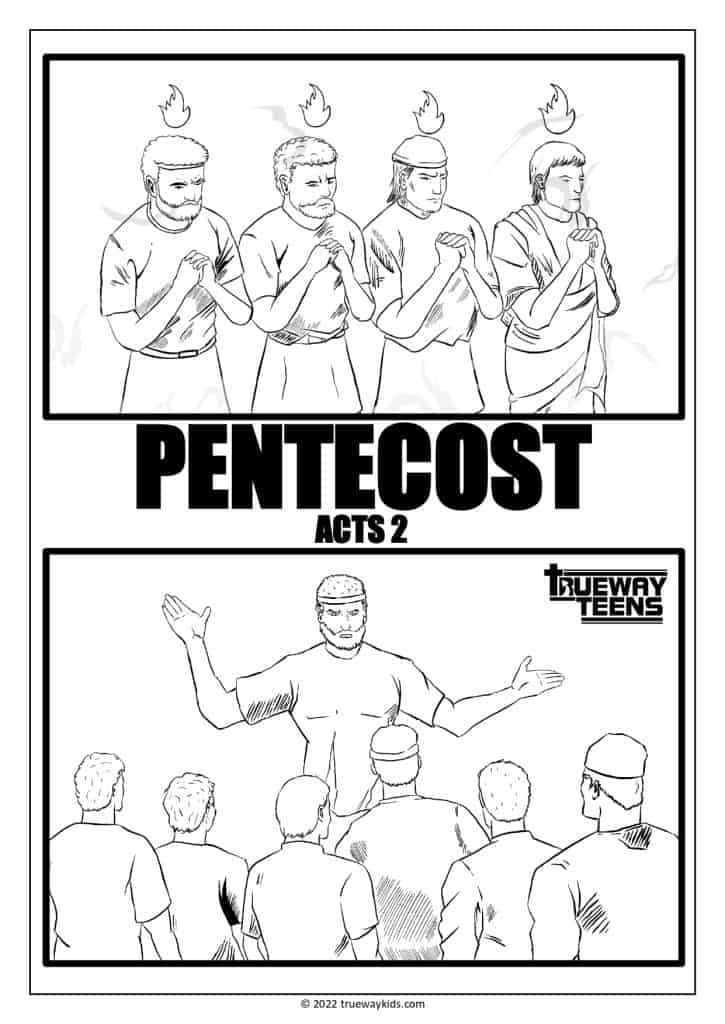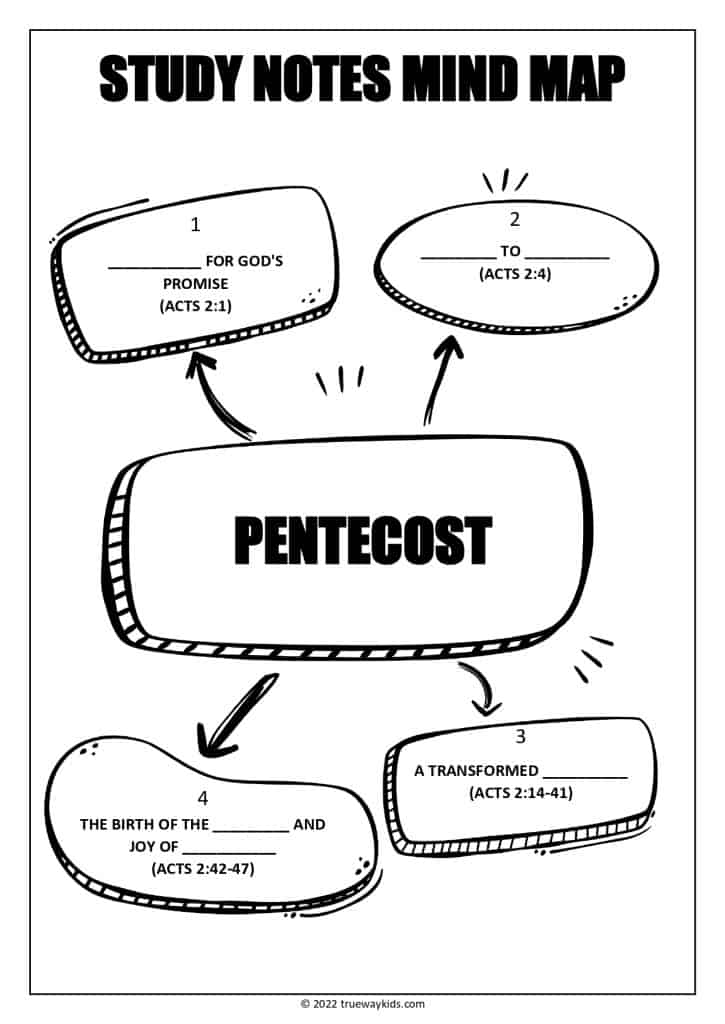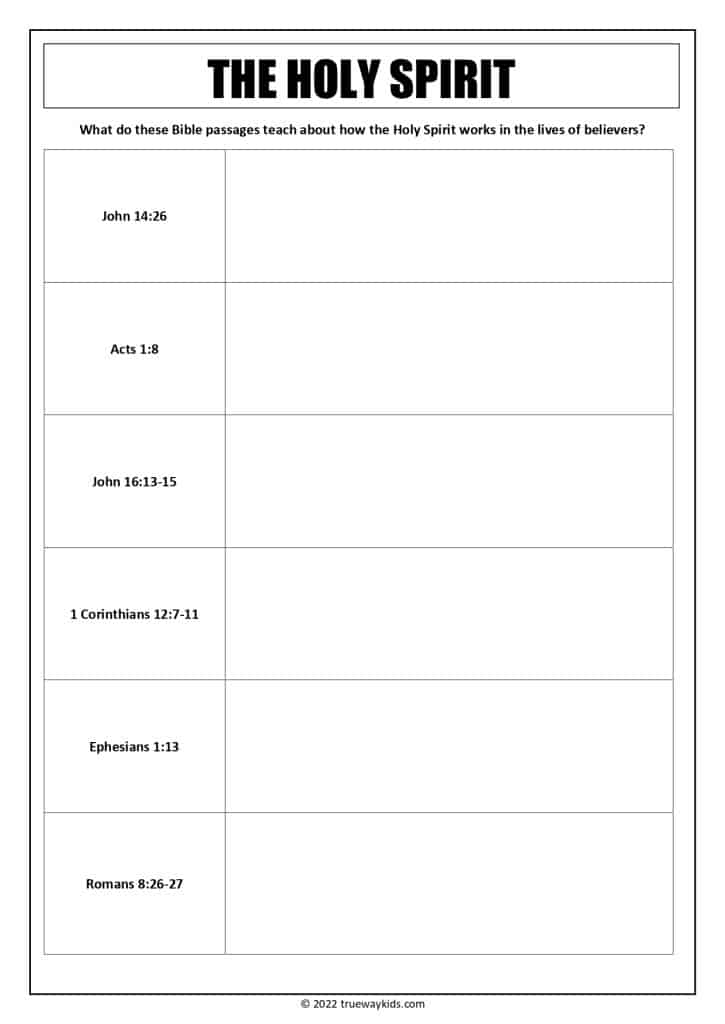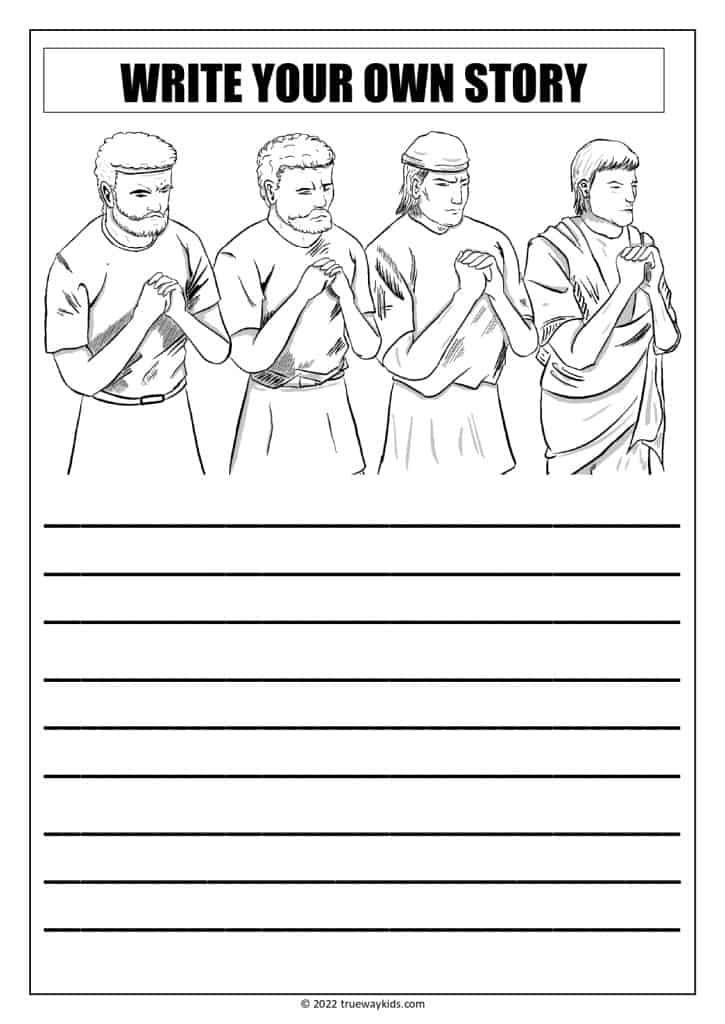In this lesson, we will learn about the day of Pentecost. This lesson relates to pre-teens and teens and by the end of this lesson, they should have learnt about the following:
- God keeps His promises.
- The Holy Spirit empowers our witness.
- The early church.
BIBLE PASSAGE: Acts 2
MEMORY VERSE: Peter replied, “Repent and be baptized, every one of you, in the name of Jesus Christ for the forgiveness of your sins. And you will receive the gift of the Holy Spirit.” Acts 2:38
DOWNLOAD THE FREE PRINTABLE LESSON

BIBLE STUDY NOTES FOR TEENS
Luke follows on from his first letter (The Gospel of Luke), which covers the life of Jesus on Earth, by writing a second letter (Acts) to present a history of the early church. Historically it recounts the first 30 years of the church.
Acts is a valuable historical record full of lessons and dynamic examples of the work of the Holy Spirit in the early days of the church.
Luke begins with Jesus’ last days on earth. In chapter two, Luke begins on the continuation of Jesus’ work on Earth through His Church and begins with the outpouring of the Holy Spirit upon the apostles.
Through this beautiful account, we will find how the Holy Spirit commissioned the apostles to be witnesses of Jesus through the world; how Peter went from being a timid and hesitant disciple to being a courageous proclaimer of the gospel, as well as the conversion, and life of the first Christians.
The word Pentecost means “fiftieth” and refers to the feast of weeks in the Bible. It was celebrated 50 days or seven weeks after the Passover and was one of the three great annual feasts of Israel (Shavuot) and for which the people gathered in Jerusalem.
The Jewish nation celebrated Pentecost long before the day of Pentecost that we think of in Acts 2. During the Jewish Pentecost, the Jews would present the first fruits of their harvests. Acts 2 was the day of the first fruits of Christ’s church, the beginning of the great harvest of souls who would come to know Christ as Lord and Saviour.
1. WAITING FOR GOD’S PROMISE (ACTS 2:1)
Historians believe that the disciples were gathered in a room near the Temple, discussing the Old Testament passages and singing the Psalms. Ten days had already passed since Jesus ascended to Heaven and commanded them not to leave Jerusalem but to await the promise of God the Father (Acts 1:4-5).
The disciples / Apostles were not alone. Many other people followed Jesus during His earthly ministry and remained faithful to Him. So here in the room with have one hundred and twenty persons waiting as Jesus commanded.
There are few things more difficult in the Christian life than waiting on God’s promises —we want everything now. The believers knew Jesus’ command to wait on the promise of the Holy Spirit. They knew the day would be coming soon, but they didn’t know the exact date and time. So, what did they do? They waited and waited well.
Faith means patiently waiting on God. Paul wrote to the Galatians, “And let us not grow weary while doing good, for in due season we shall reap if we do not lose heart” (Galatians 6:9). Paul said, we shall reap in due season. Not immediately.
We see the disciples return to fishing in the gospels, but now they are holding on to God’s promise and waiting as Jesus commanded. While they waited, they praised God, sang Hymns, discussed Scripture, reflected on Jesus’ teaching, and prayed together.
We no longer need to wait for the promise of the Holy Spirit, but we have other promises from God that we need to wait on. (Not least, Jesus’s return). Let us follow the early believers’ steps and not give up doing good as we wait. Let’s be committed to prayer, Bible reading, praise, fellowship and evangelism as we wait.
2. POWER TO WITNESS (ACTS 2:4)
The coming of the Holy Spirit involved a sound to hear, a miracle to see and an experience. The sound of a mighty wind filled the house. In the Bible, we see wind is often used to typify the work of the Holy Spirit, His sovereign and unpredictable movements.
Then they saw tongues like fire. These tongues denote speech and refer to the miraculous gift of speaking in other tongues. Further, fire usually indicates the presence of God, the zeal of His holiness and purity, which consumes everything that is impure and sanctifies it.
Before the day of Pentecost, God the Holy Spirit would descend upon people, but it would be temporarily, not permanently. After Pentecost, God came to dwell within His people.
Jesus said in Acts 1:8 that they “shall receive power from the Holy Spirit and shall be witnesses.” The power of the Holy Spirit is essential for a Christian witness.
In 1 Thessalonians 1:5 Paul says, “Our gospel came to you not only in word, but also in power and in the Holy Spirit and with full conviction.”
Paul also wrote to Timothy, “God did not give us a spirit of timidity but a spirit of power and love and self-control. Do not be ashamed then of testifying to our Lord … but take your share of suffering for the gospel in the power of God.” (2 Timothy 1:7-8)
Boldness and effective Christian worship come only from the fullness of the Holy Spirit.
When the disciples were filled with the Holy Spirit, not only did they have boldness and courage, but they began to speak in other tongues, as the Spirit gave them the ability.
We read of people from all over the world who were in Jerusalem celebrating the Jewish Shavuot. They spoke different languages, but they all understood what the believers were saying in their own native languages.
The Holy Spirit enables us to be a witness beyond our natural abilities. When we allow Him to work through us, He will also work in the lives of the hearers.
3. A TRANSFORMED LIFE (ACTS 2:14-41)
Remember Peter? He was the disciple who denied Jesus three times with oaths and curses (Matthew 26:74). In Acts 2, He was a different person, full of the Holy Spirit; he has ceased to be hesitant, scared or embarrassed. He had become a passionate proclaimer of the gospel. Peter is filled with the power of the Holy Spirit and is empowered to preach his first sermon.
Peter’s sermon is the first in a series of discourses recorded in Acts. Since it is addressed to the Jews of Jerusalem, it contains scriptural evidence on the miracle of tongues as the fulfilment of the prophecy of Joel 2, as well as the proclamation of Jesus as the Messiah. It concludes with a call to repentance and baptism as a requirement to receive God the Holy Spirit.
Remember, a few years previously, Peter was a fisherman. Now, he is proclaiming the Gospel message to a huge crowd of people from around the world.
Never underestimate what God can do through your life when you meet with Jesus and are filled with the Holy Spirit. 2 Corinthians 5:17 says, ‘Therefore, if anyone is in Christ, the new creation has come: The old has gone, the new is here!’
Your past failures and successes don’t count. In Christ, we are given a new start. We know longer need to do things by our strength or ability but are empowered by the Holy Spirit.
4. THE BIRTH OF THE CHURCH AND JOY OF FELLOWSHIP (ACTS 2:42-47)
Peter preached, and God worked in the hearts of the crowd. Acts says that three thousand people repented and were baptised on that day.
But what happened next? Did they just go back to their normal life and way of living? No! The new believers dedicated themselves to God, learning from the apostles, meeting in prayer, and communion together.
So powerfully had God’s love been poured into their hearts that these people from all around the known world (different nations and races) all felt like members of the same family and community. They did not regard their material properties as their own. The joy of their salvation overflowed in every detail of life. Their lives became a hymn of praise and thanksgiving.
CONCLUSION
Acts 2 is a crucial turning point for every believer because it describes the outpouring of God the Holy Spirit upon the church. It reminds us that we no longer live by our strength, now, God lives through us.
YOUTH GAMES AND ACTIVITIES FOR PENTECOST
NO WORDS
- At Pentecost, there were people from all around the world who spoke different languages.
- They each understood the Apostles in their own language.
- But in this game, you must make yourself understood with no words.
- Write some basic phrases on pieces of paper and place in a hat.
- The player picks a paper at random and acts it out until the group can guess what is on the paper.
BLOW A MIGHTY WIND
- Create a course or maze on the table.
- Give each player a pompom and a straw.
- The player should try to blow the pompom through the course in the shortest amount of time.
- The quickest player wins.
NEWS REPORTER
Write some character names on pieces of paper and place into a bowl. Here are some examples:
- News Reporter
- Peter
- A disciple
- A believer in the upper room
- A mocking person in the street.
- A Religious leader
- A small child taken to the room by a parent.
- A new believer.
Write a character for each person present.When everyone has a character, the news reporter interviews each person about what happened at Pentecost.
Free printable Teen Worksheets in the lesson pack








DOWNLOAD THE FREE PRINTABLE LESSON




